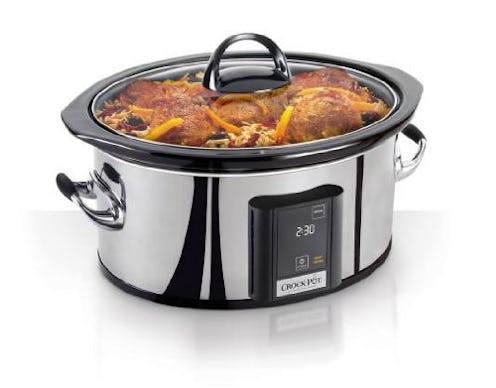Life
Is It Safe to Leave The Crock-Pot On All Day?
Leaving the oven or stove on when you leave the house is a big no-no, but there's one kitchen appliance that you're supposed to leave unattended for hours: the slow-cooker, or, as it's more colloquially known, the Crock-Pot (which you can find here for purchase at Amazon). While these devices are designed to be left on for long periods of time without supervision, it's sometimes hard to believe that it's completely safe to do so — especially since most kitchen rules dictate you should never leave a heating appliance unattended. So, is it really OK to leave your Crock-Pot on all day? Here's what you should know.
The good new is, yes, it's technically safe to leave your slow-cooker on and go about your day — as long as you are using the appliance correctly. The key is to make sure you follow the safety precautions outlined in the device's instruction manuals (many of which are also available online). To help you out, we rounded up some great tips to help you ensure you're using your slow-cooker safely and properly. As long as you follow these simple rules, you'll no longer feel any anxiety about leaving your Crock-Pot on while you're at work or running errands. Just throw in the ingredients for your favorite slow-cooker recipe, turn it on, and hit the road.
1. Place It On A Hard, Flat, Heat-Proof Surface
It's important to remember that your slow-cooker can't just be set down anywhere. Since the device generates heat, it's best not to leave it on wooden surfaces. Instead, make sure it's sitting on heatproof surfaces, like granite, marble, or a tiled countertop.
Speaking of location, it's also important to make sure your slow-cooker is placed at a slight distance away from your wall. Since heat comes off its sides and top, you want to make sure the appliance is at least a few inches away from the wall or other objects.
2. Keep The Top On
Crock-Pot recommends leaving the top on while your dish is cooking, especially if you're not there to supervise. As the website puts it, "Always cook with the lid on for the recommended time. Do not remove the lid during the first two hours of cooking unless the recipe calls for lid removal."
Why? The lid keeps the heat contained in the slow-cooker, ensuring that your food gets cooked properly and that the steam doesn't affect any surrounding objects in your kitchen. It also ensures that the liquid in your cooker doesn't evaporate, which could cause your food to burn. Speaking of liquid…
3. Fill The Slow-Cooker Appropriately
It's important to fill the slow cooker with the right amount of liquid, so that it doesn't either overflow or evaporate too quickly and burn. As Crock-Pot puts it, "To avoid over- or under-cooking, always fill the stoneware 1/2 to 3/4 full to conform to recommended cook times with the exception of certain cakes and custards."
4. Turn The Setting To Low
Slow-cooker recipes are devised to cook over several hours, so it's best to turn the heat setting down to low — especially if you're planning to be out of the house for the length of a full workday. The low setting will slow down the cooking process, ensuring that your meal isn't overcooked, or even burnt while you're out.
